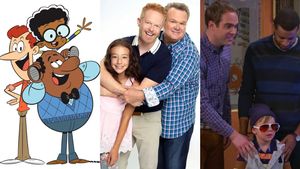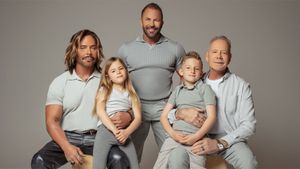
CONTACTAbout UsCAREER OPPORTUNITIESADVERTISE WITH USPRIVACY POLICYPRIVACY PREFERENCESTERMS OF USELEGAL NOTICE
© 2025 Equal Entertainment LLC.
All Rights reserved
All Rights reserved
By continuing to use our site, you agree to our Privacy Policy and Terms of Use.
We need your help
Your support makes The Advocate's original LGBTQ+ reporting possible. Become a member today to help us continue this work.
Your support makes The Advocate's original LGBTQ+ reporting possible. Become a member today to help us continue this work.
Calling the discriminatory policy "one of the most pressing civil rights issues in our great country today," attorneys challenging "don't ask, don't tell" in federal court said Tuesday the U.S. government has no legitimate basis for maintaining the ban on gay soldiers serving openly in the armed forces.
Opening statements in Log Cabin Republicans v. United States of America began shortly after 9 a.m. Pacific time in the federal courtroom of U.S. district judge Virginia A. Phillips in Riverside, Calif. White and Case attorney Dan Woods, representing the national gay Republican group that filed the lawsuit in 2004, said in the non-jury trial that the government denies gays and lesbians "the privilege of serving their country if they choose to be as candid and honest about their human nature as their heterosexual comrades are."
Woods said the legal landscape regarding the rights of gays and lesbians has shifted dramatically since DADT became law, most notably with the Supreme Court's decision in Lawrence v. Texas striking down sodomy laws. "We intend to prove at this trial that 'don't ask, don't tell' does not advance an important government interest, that its intrusions into the constitutional rights of homosexuals do not significantly further any important government interest, and that those intrusions are not necessary to further any important government interest," Woods said in a 20-minute opening statement.
Assistant U.S. attorney Paul Freeborne said that Log Cabin has no standing to sue on behalf of its members affected by the policy. Log Cabin has identified two such individuals -- an anonymous Army Reserves lieutenant colonel who continues to serve in the military, and Servicemembers United executive director Alex Nicholson, who was discharged in 2002. Freeborne said in a five-minute opening statement that Log Cabin has failed to establish the membership of both individuals.
That issue aside, "We do not believe that a trial is necessary or appropriate" and "the court should resolve this case as a matter of law," Freeborne said.
As such, the Justice Department will not offer any witnesses or evidence other than the legislative history of DADT and Congress's 1993 purported intent to secure military effectiveness and cohesion in passing the law.
In testimony, Freeborne repeatedly objected to any questions asked by Woods relating to the motivation of lawmakers in enacting DADT, and whether antigay animus may have played a role in its passage. He also attacked expert witness Nathaniel Frank, a veteran DADT scholar and author of Unfriendly Fire: How the Gay Ban Undermines the Military and Weakens America who testified about the historical discrimination of gays in the military. "Professor Frank is an advocate. A heartfelt advocate, but an advocate," said Freeborne, who works in the Justice Department's Civil Division in Washington, D.C.
Judge Phillips seemed largely unmoved and increasingly aggravated by Freeborne's objections as the afternoon progressed. "If this were a jury trial, ... I would only once give a limiting instruction to the jury," Phillips said. "So frankly, to stand up and make that objection every time when it's a court trial, I'm really puzzled that you're doing that, because it's not my first trial."
In his testimony, Frank detailed a history of systemic discrimination against homosexuals in the military beginning around the time of World War I.
Though empirical research including studies in the 1950s and a 1993 RAND study found no rational basis for excluding gays from service, the discrimination continued and eventually was codified as "don't ask, don't tell," a policy largely influenced by the antigay sentiments of key lawmakers and military leaders, he said. Frank recalled one interview with Charlie Moscos, a sociologist who influenced DADT policy and claimed to have coined the term "don't ask, don't tell." Frank asked Moscos whether allowing gays to serve openly would truly affect unit cohesion -- an assertion often made by Moscos and other proponents of the policy.
"Fuck unit cohesion," Moscos replied, according to Frank. "I don't care about that. This is a moral issue to me."
The timing of the trial could prove problematic for President Barack Obama and the Department of Defense, which has come under fire for a survey released last week to 400,000 service members regarding the repeal of "don't ask, don't tell" that some repeal advocates have blasted as offensive and unnecessary. "Perhaps [the trial's] greatest importance is the political dilemma it is creating for the Obama administration, which has felt compelled to defend the constitutionality of a policy it is trying, however slowly, to end," said Jon W. Davidson, legal director for Lambda Legal.
Log Cabin argues that the suit puts needed pressure on DADT repeal. "We believe our case can work in concert with the legislative process that is now underway," the group said in a recent press release. "We must remember that the legislation is conditional upon the House and Senate passing their own bills, and then coming together in a conference committee to work out the details of a final bill that will then have to pass both chambers."
In contrast to the federal Proposition 8 trial in San Francisco that attracted significant media attention and public attendance, the Riverside federal courthouse was decidedly less abuzz. Media outlets covering opening statements included the Associated Press, the Los Angeles Times, and LGBTPOV as well as the local LGBT advocacy group Equality Inland Empire.
"We came to show support for the cause, to show that there's community support here for overturning 'don't' ask, don't tell,'" Equality Inland Empire steering committee member Eva-Genevieve Scarborough said during a court break. "I was expecting the courtroom would be full and more of us to be out here."
Testimony resumes on Wednesday.
From our Sponsors
Most Popular
Watch Now: Pride Today
Latest Stories
Congress members demand that EEOC address gender identity discrimination
June 13 2025 5:26 PM
LGBTQ+ immigrants face 'most immediate risk' of ICE raids in Los Angeles
June 13 2025 3:21 PM
'No Kings' protests: What to know about the June 14 rallies against Trump
June 13 2025 12:48 PM
The road to Obergefell: Looking back on a decade of marriage equality
June 13 2025 9:30 AM
California sues Trump admin over threats to trans athletes
June 13 2025 7:00 AM
Trading camo for couture, why I refuse to disappear in Trump’s America
June 13 2025 6:00 AM
Gay congressman confronts Pete Hegseth over Harvey Milk ship, military diversity
June 12 2025 9:15 PM
Iowa bans Medicaid from covering gender-affirming care for adults
June 12 2025 5:11 PM
Judges forced a Florida Pride drag show indoors at the last minute
June 12 2025 1:14 PM








































































